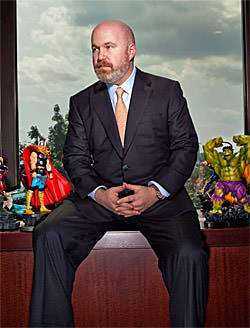Were Quantitative-Easing Alarmists "Knaves, Fools"? No, Says Cliff Asness.
City University of New York's Paul Krugman recently mocked folks who signed a 2010 letter warning about negative outcomes from the Federal Reserve's quantitative easing (QE). Specifically, the signatories had warned of rampant inflation, "currency debasement," massive distortion in financial markets, and continuing high levels of unemployment. The most-catastrophic versions of these things haven't happened and when asked by Bloomberg a couple of weeks ago to explain the failure of the predictions, many of the folks involved hemmed and hawed or simply said that they hadn't set a deadline for when QE would blow up the economy.
"Note the absence of a date," explained Niall Ferguson, one of the signers. "There is in fact still a risk of currency debasement and inflation." Others said that in fact everything they warned about was happening. Inflation isn't showing up in the official measure, they said; the stock market is bubbling; the economy is barely moving; and more.
Krugman characterized the signers as the sort of "fools and knaves" who "argue in bad faith" and can't admit when they're wrong. He's got at least part of a point. Certainly, inflation hasn't spiked in the way that basic monetarist policy would have predicted.
But Krugman's cock-a-doodle-doing is similarly overplayed. As AQR Capital's Cliff Asness, who signed the letter, writes in an excellent piece at RealClearMarkets about the matter, QE has been revealed to be a dud in virtually just about every way possible—except for making the 1 percent even better off.
This is not the opening statement of a guy arguing in bad faith:
Those looking for a blanket admission of error will get part of what they want; a small part. Those hoping I hold the line denying any misstep will also be disappointed. I believe truth, as is often the case in similar situations, lies in the middle of these and I prefer truth, as I see it, to any reader walking away sated.
He stresses that in signing the letter, nobody made a prediction but called attention to a heightened risk. And when it comes to inflation, the idea of the Fed pumping huge amounts of money into the banking system via an unprecedented move clearly "represented at least a heightened risk" for inflation. "By writing the letter we clearly thought this risk was higher than others did, and wished to stress it, and it has not (as most commonly measured) as of now come to bear. Our, and my, (half) bad."
But if CPI inflation didn't come to pass, notes Asness, neither did much of anything else.
To the extent inflation worriers like us were wrong, so were those predicting great economic benefits. The Fed clearly wanted this money lent by banks and spent by companies on investment and by people on consumption. They didn't get that, and we didn't get the inflation we feared. This is not to say that low interest rates, real and nominal, and high prices for risky assets (and the supposed "wealth effect" that comes with them) were not Fed goals. They clearly were. But it seems these intermediate goals have not had their desired effect on the real economy.

The main reason that inflation hasn't spiked, Asness argues (and in this, he's in wide company) is because the Fed is paying banks "low but positive interest rates" on reserves, thus keeping the dough from circulating in the absence of strong demand. That means the Fed's magic money is neither "creating inflation as we feared, or helping the economy as they [QE proponents] hoped."
Which isn't to say there isn't inflation going on.
You'd be hard pressed to find many economists or Wall Street professionals who don't see current extremely high asset prices, and low forward looking returns to investors, as at least a partial consequence of the cocktail of QE, loose monetary policy, and financial repression….
While not as dangerous so far as we thought, it appears QE was only mostly useless. To the extent even that is only mostly true, where effects did show up, it actually caused rather a lot of inflation, but inflation that went straight into the pockets of those who needed it least and whom [Krugman] wouldn't swerve his car to avoid. That is, it inflated financial assets, benefited the rich, and enhanced inequality.
Asness also notes that the Fed is only now stopping QE and we've still got a very loose monetary policy, so it's not yet clear how this whole grand experiment is going to play out.
It's possible that as the "real economy" picks up, the Fed will in fact be able to soak up all the money it's pumped into the system at exactly the right rate so that it doesn't cause any stalls or undue inflation (whatever that might be). Given the general failure of the last several years (decades? centuries?) of macroeconomic planning to fine-tune the economy, I'm skeptical. For those who need convincing of economists' ability to tinker with the economy like a Formula One car engine, I highly recommend Robert Samuelson's The Great Inflation and Its Aftermath, which catalogues the folly and hubris of a previous generation of ultra-hubristic folks who really do deserve to be considered fools and knaves.
Asness's whole piece is well worth reading. Check it out here.


Show Comments (122)